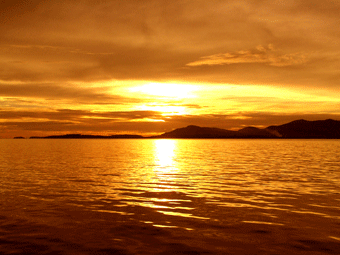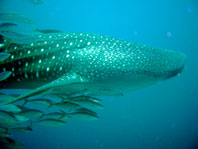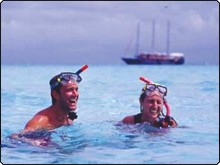|
Thailand Liveaboard Diving
Destinations
Divesites:
Similan Islands
Fifty-two miles
north-west of Phuket lies Koh Similan Marine National Park. This
is an archipelago of nine granite islands, reputed to be in the
world's top ten dive sites. The Similans provide a huge variety
of diving topography and boast the richest variety and abundance
of reef fish in Thailand.
During southern
Thailand's hot season in February, March and April, the rising
sea temperature causes a boom in plankton levels. This in turn
attracts whale sharks and manta rays to be drawn to the Similan
islands to feed. The eastern Similan dive sites feature lush
coral gardens with sea anemones and a host of colourful reef
fish. Seas are calm and dives are at moderate depths, suitable
for all levels of divers and also for snorkellers. Western dive
sites feature enormous granite boulders, descending down to 40
meters with swim throughs,caves and tunnels, making the diving
more challenging. Currents provide nutrients for a colourful
variety of soft corals and seafans. Above sea level, the islands
are covered in lush rainforest, and there is an abundance of
bird life.
A typical Similan
island trip will be 3 or 4 days and have 12 to 14 dives.
Depending on which boat the divers are on, there is the
opportunity to combine a trip to either the Hin Daeng / Phi area
or the Burma Mergui Archipelago area.
Boulder City
(Island Three - Koh Payan)
Boulder City lies some 200 meter south of Koh Payan. The dive
site is completely submerged with two mooring buoys to mark the
location, one at the north end and one at the south. Descending
down the north line takes you to 20 meters and the south line to
30 meters. This is a dive in the 20 to 30 meter mark making it
not a long dive but the underwater scenery here is spectacular
with large granite boulders some bigger than a house, with
swim-throughs and the chance of swimming with large pelagic
fish.
Eagle and manta rays cruise around the large boulders while
large fan tail rays rest in the sandy bottom. This is also where
I have been lucky enough on two separate occasions last season
to witness the mating of leopard sharks. With a family of large
humphead parrot fish and napoleon wrasse living in the area the
beautiful soft corals and large gorgonian sea fans make this an
eye opening dive site with the occasional whale shark cruising
past. living in the area the
beautiful soft corals and large gorgonian sea fans make this an
eye opening dive site with the occasional whale shark cruising
past.
Koh Miang # 4 Honeymoon Bay
Honeymoon Bay is a beautiful bay on the back side of island 4
with its quiet beach and tranquil bay it’s the perfect place for
a snorkel or our sunset dives on the gentle slopping reef down
to 24 meters. In the shallows around the coral heads you will
find octopus, crabs and mantis shrimps on the hunt for food.
With the occasional hawksbill sea turtle and white tip reef
shark patrolling the reef will keep you busy on your dive.
Koh Haa # 5 Hideaway Reef
Hideaway reef is great place for check out dives or night dives.
With depths along the reef at 20 meters this site has so me
spectacular coral bommies. Covered in soft corals the colors are
superb and a great dive for macro photographers with harlequin
and ornate ghost pipefish. Down in the sandy bottoms are lots of
spotted garden eels poking their heads out to catch a passing
feed with the well camouflaged Thai flat fish. On the reef there
are plenty of surgeons, butterfly and angel fish with blue fin
trevally and goat fish on the hunt for small bait fish. me
spectacular coral bommies. Covered in soft corals the colors are
superb and a great dive for macro photographers with harlequin
and ornate ghost pipefish. Down in the sandy bottoms are lots of
spotted garden eels poking their heads out to catch a passing
feed with the well camouflaged Thai flat fish. On the reef there
are plenty of surgeons, butterfly and angel fish with blue fin
trevally and goat fish on the hunt for small bait fish.
Koh Payu # 7 Deep Six
Deep six lies on the northern tip of island 7 and has a buoy
line running down to 18 meters there as the name implies you can
descend down to over 60 meters. Here the dramatic underwater
boulders have formed some excellent swim throughs, tunnels and
canyons that make this an exciting dive. But down in the soft
coral garden the largest gorgonian sea fans in the Similans
survive untouched. With the occasional manta ray gliding passed
in the blue will make for an enjoyable dive.
Elephant Head, Hin Pousar
This is probably the most famous dive site in the Similan
Islands, it lies in between island 7
(Koh Payu)
and island 8
(Koh Similan).
With three large rocks breaking the surface these granite
boulders run down to over 50 meters. This is an exciting dive.
Not too much coral growth but the way the boulders are lying on
top of each other has left an intricate web of tunnels and swim- throughs. Large overhangs with oriental sweetlips and harlequin
sweetlips which are only found in the Andaman sea hang around in
small groups to escape the currents. Coming in and out of the
tunnels keep an eye open for the colourful clown triggerfish and
the white tip reef sharks resting on the bottom. Currents can be
quite strong sometimes but this makes for an exciting and fun
dive.
Koh Similan # 8 Beacon Point
Beacon point lies on the south tip of island # 8 and is one of
the deeper sites running down to over 40 meters. This is a great
spot to look for stingrays, including the small and common blue
spots and mask rays to the larger black spotted fantails and
Jenkins rays. With large granite boulders and the occasional
White tip reef shark swimming round the boulders, try to see if
you can spot the blue ribbon eels poking their heads out from
their sandy holes.
Koh Similan # 8 Beacon Reef
Beacon reef lies on the east side of the island and has the
longest reef in the Similans. This is a great check out or night
dive as the gentle slopping reef runs down to around 22 meters.
With lots of hard and soft corals the reef fish here are in
abundance with the lion fish and moray eels hiding in the holes.
A glance out in to the blue can prove rewarding with large dog
tooth tuna and trevallys darting in to the reef to feed on the
small bait fish.
Koh Bangu # 9 North Point
North point lies on the west side of the island with a dramatic
underwater scenery of large boulders with canyons and swim
throughs. As you descend down the line passed the tall fin bat
fish and head through the tunnels, keep your eyes open for a
pair of Napoleon wrasse. In between the large canyons grow large
gorgonian sea fans with excellent soft corals hiding harlequin
ghost pipe fish but a look out into the blue can be rewarding
with frequent visits from the graceful manta ray passing over
head.
Koh Tachai Island -
The Plateau
Koh Tachai lies 22 nautical miles south of Surin, the dive site
is located around 200 meters south of the i sland and is marked
with a bouy line which descends down to 16 meters to reach the
top of the plateau. From here you decide which way to go ? North
or South. North takes you over the plateau to the beautiful
coral garden at around 22meters to 26meters with some of the
best soft corals and sea fans in the area, which will keep
underwater photographers busy. South takes you down over the
large boulders to between 36meters and 40meters to reach the
sandy bottom looking for the docile leopard shark and large
stingrays. Up above schooling great barracudas with tunas and trevallys darting down to catch the baitfish hanging around the
reef. With a multitude of small creatures to look at try not to
forget a look into the blue to see the manta rays gliding past
and the occasional whale shark make Koh Tachai a spectacular
dive site. sland and is marked
with a bouy line which descends down to 16 meters to reach the
top of the plateau. From here you decide which way to go ? North
or South. North takes you over the plateau to the beautiful
coral garden at around 22meters to 26meters with some of the
best soft corals and sea fans in the area, which will keep
underwater photographers busy. South takes you down over the
large boulders to between 36meters and 40meters to reach the
sandy bottom looking for the docile leopard shark and large
stingrays. Up above schooling great barracudas with tunas and trevallys darting down to catch the baitfish hanging around the
reef. With a multitude of small creatures to look at try not to
forget a look into the blue to see the manta rays gliding past
and the occasional whale shark make Koh Tachai a spectacular
dive site.
Richelieu Rock
Richelieu lies 7.5 nautical miles east of the Surin islands
national marine park. Here this large rock pinnacle just breaks
the surface at low tide and descends down to around 33 meters to
the sandy bottom. The northern side has an excellent wall with
lots of cracks and holes for you to look inside. The wall is
covered with coral and zig zag oysters where you can find over
ten species of moray eels like the commonly spotted white eyed,
giant, yellow edged, and bartail morays or the shy dragon,
leopard, honeycomb and zebra morays.
The wall is all so home to many species of shrimps from the
cleaners, anemone, saron,
squat
 and the colourful harlequin
shrimps. The west side contains mostly soft corals and sea fans
with ghost pipefish and tigertail sea horses hiding in between
the branches. But its here where we all so encounter large
schools of silver jacks and bluefin trevallys with chevron and
great barracudas too. and the colourful harlequin
shrimps. The west side contains mostly soft corals and sea fans
with ghost pipefish and tigertail sea horses hiding in between
the branches. But its here where we all so encounter large
schools of silver jacks and bluefin trevallys with chevron and
great barracudas too.
Its also home to the gentle giant the whale shark anywhere from
2 metre infants to 8 metre young adults. The walls seem to move with
so much life or look closely at the camouflaged scorpion, stone
and lionfishes that blend in to the rock. A truly spectacular
dive site no matter what the time of year.
|